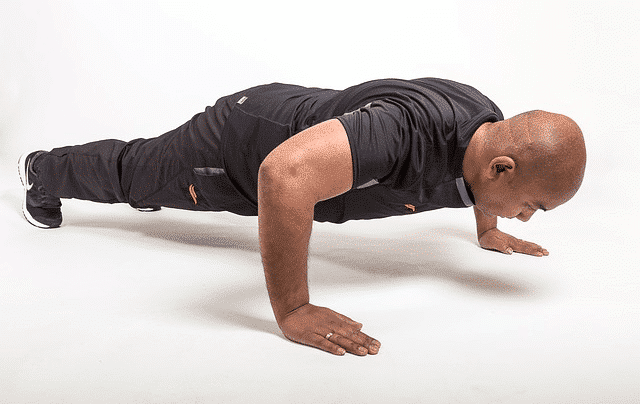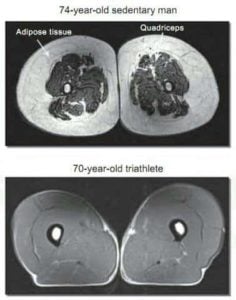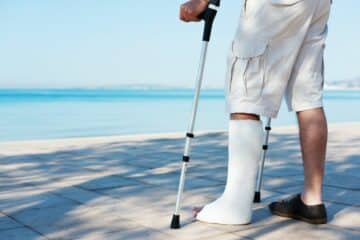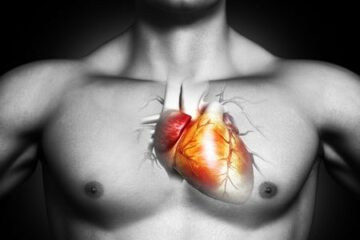
If you were asked to describe an elderly person, what sort of words would you come up with? For many, the answer probably includes something along the lines of frail or weak. And it turns out there’s a reason for this: sarcopenia, or “age-related decrease in lean muscle mass” (Siparsky et al. 2014), is a process that begins as early as age 30.
There are an enormous number of factors that contribute to sarcopenia. One major reason is that as we age, our body is not able to synthesize muscle protein to the same extent. This is combined with an increased resistance to insulin (the hormone that lowers blood sugar) and a decreased basal metabolic rate (the energy we expend at rest), all of which result in less lean muscle mass. Some other factors include “decreased physical activity, lower hormone excretion, nutritional deficits, and possibly chronic inflammation” (Siparsky et al. 2014).
If you’re a health and fitness aficionado like myself, then this information may seem quite depressing. Luckily, sarcopenia is not inevitable. Here’s what you can do to help counteract this age-related process:
- Strength Training: Despite the reduction in protein synthesis described above, older people can still respond to both aerobic training and resistance training (so don’t think your exercise is in vain!). Further, some research shows that regular exercise 4-5 times per week can actually prevent the usual decline in muscle mass and strength with age. In a study on runners in particular, lifelong exercise prevented the loss of motor units (functional units that control muscle contraction) in participants aged 65!
- Diet: According to Paddon-Jones & Rasmussen 2009, an adequate amount of protein (~25-30 grams) with each meal is essential for protein synthesis as we age. Another dietary factor we must also take into account is the building block of protein known as an amino acid. Some amino acids are essential, meaning the body can’t synthesize them, so they must be consumed in the diet. Aging reduces the ability of skeletal muscle “to respond to low doses of essential amino acids” (Paddon-Jones & Rasmussen 2009). However, supplementation with leucine (an essential amino acid) has been shown to significantly increase protein synthesis in the elderly.
- Hormones: As men and women age, there is a decrease in the sex hormones. For men, testosterone begins to decline at age 35, and for women, estrogen declines after menopause. Decreased testosterone and decreased estrogen can both lead to reductions in lean muscle mass. Unfortunately, while the solution here seems simple, there are a number of adverse side effects with hormone therapy, including cancer. Currently, there is work on selective androgen receptor modulators (SARMs), which “bind to specific areas of androgen receptors on many cell surfaces to activate or inhibit selective functions of the steroid receptors. This selective activation/inhibition could encourage muscle growth while at the same time prevent some of the unwanted aspects of hormone therapy” (Siparsky et al. 2014). So far, the clinical trials have been promising, but there is still much research to be done on these pharmacologic options.
Hopefully this post has given you some insight into sarcopenia and strategies to incorporate to try and delay the inevitable. Sure we may not be hitting a new marathon PR in our 70s, but most of us are not doomed to become frail and weak in our old age- as long as we are willing to start putting in the work now with our diet and exercise.
By: Angleina Noriega. BS Cornell University 5/2015













Can I continue to lift free weights if I have popping or cracking in my shoulder. It doesn’t hurt, but should I stop lifting weights.
I’m 36 years old and sometimes my shoulders will popping or cracking sometimes quietly and sometimes loudly. It seems to be occurring more frequently. It’s mostly painless but can be annoying. Every couple of months when I sleep on my side and shoulder will sometimes (minor) dislocate which is painful but will not hurt after. This has been happening for several years. I don’t know if this is serious or not. I’ve not had insurance until last year so I haven’t seen a doctor about this. Should I make and appointment with a physician at the Sport, Spine and Joint clinic in my city?. Thank you for your advise.
Great article. I have a completely torn acl that was torn in my 20’s and I recently tore my media meniscus. I am an active person as I ski and play tennis regularly. The orthopedic surgeon recommended therapy and a knee brace. Even with the knee brace I hear popping in the knee when I play tennis. Do you think I should be pushing to have surgery.
The surgeon has indicated it is much harder to recover from surgery the older you are along with a very strong possibility I will have pain in the knee. Currently, I have no pain and I work out at the gym 6 days per week so I only feel the need for stronger knee when I play tennis. So far I have not gone sking but I do plan on going next year. I appreciate any guidance in this matter
Curious to know what you think are the best (healthier) sources of protein?
I prefer plant based protein supplements. See the website NutritionFacts.org